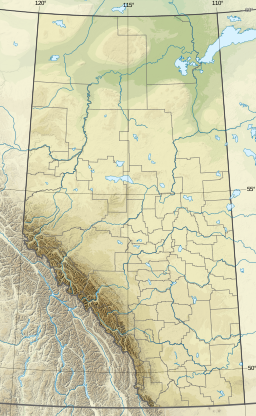Steele Lake
Appearance
This article includes a list of references, related reading, or external links, but its sources remain unclear because it lacks inline citations. (December 2023) |
This article needs additional citations for verification. (December 2023) |
| Steele Lake | |
|---|---|
| Location | Municipal District of Lesser Slave River No. 124, Alberta, Canada |
| Coordinates | 54°38′55″N 113°46′32″W / 54.64861°N 113.77556°W |
| Primary inflows | French Creek |
| Primary outflows | French Creek |
| Catchment area | Athabasca River |
| Basin countries | Canada |
| Max. length | 5.4 km (3.4 mi) |
| Max. width | 3.2 km (2.0 mi) |
| Surface area | 6.61 km2 (2.55 sq mi) |
| Average depth | 3.2 m (10 ft) |
| Max. depth | 6.1 m (20 ft) |
| Surface elevation | 659 m (2,162 ft) |
| References | Steele Lake |
Steele Lake is a small sized lake in north central Alberta. It is located about 180 kilometres (110 mi) north of the city of Edmonton. Named for Ira John Steele, a soldier killed during World War I, the lake was originally named Cross Lake, for its distinctive shape, and lent that name to the surrounding Cross Lake Provincial Park.
Despite its small surface area, Steele Lake's local drainage basin is quite large, gathering water from the smaller September Lake, Frances Lake, Banana Lake, and other nondescript ponds and creeks. The lake feeds into the Athabasca River catchment area, eventually reaching the Arctic Ocean.


